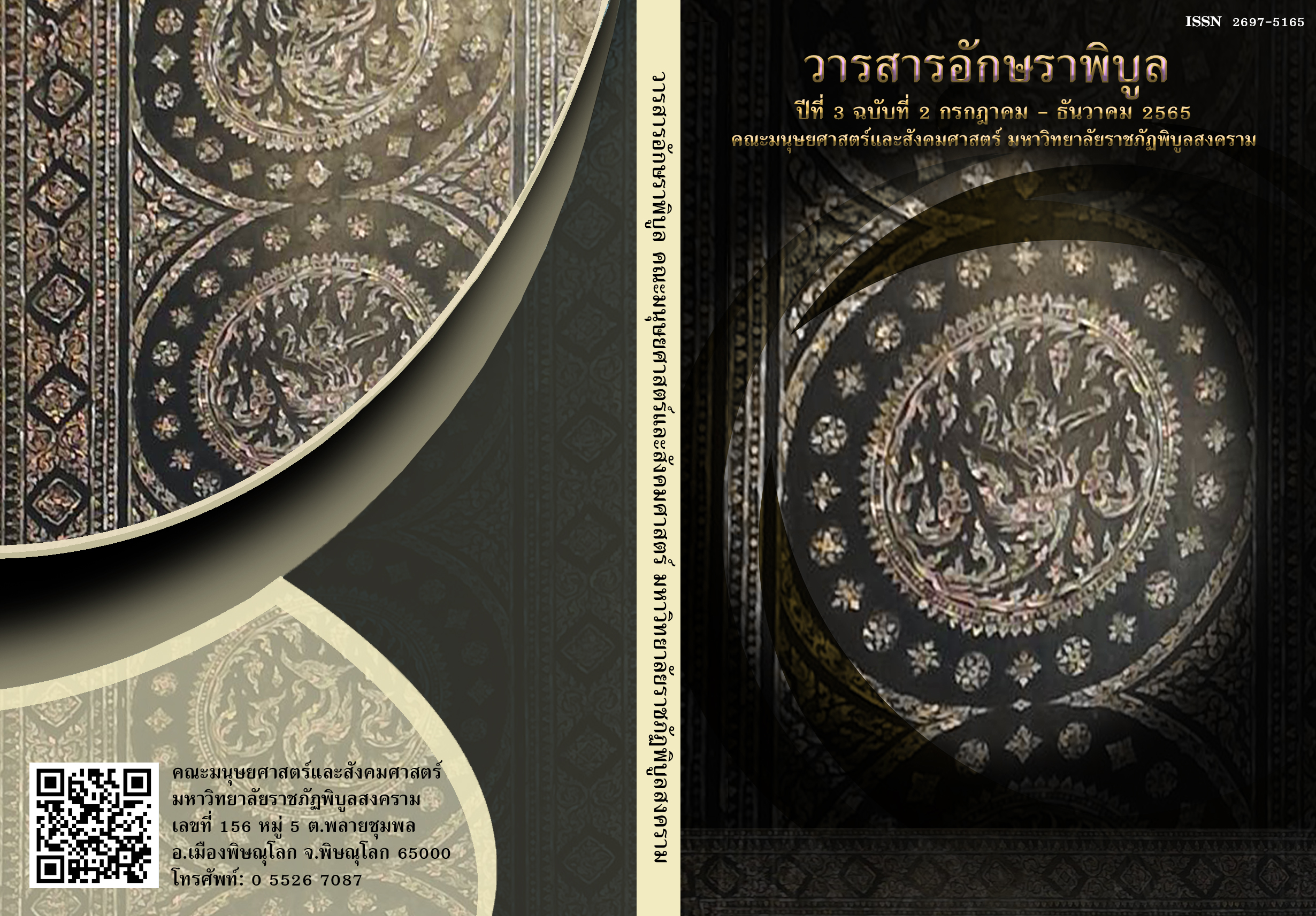The Effects Student - Led Questioning on Student Confidence, Motivation, and Engagement Reading English - Language Short Fiction Texts in a Secondary School in the Lower North of Thailand
คำสำคัญ:
การพึ่งพาตนเองของผู้เรียน , การมีส่วนร่วมของผู้เรียน , กลยุทธ์การตั้งคำถามบทคัดย่อ
การศึกษาเชิงคุณภาพนี้มีวัตถุประสงค์เพื่อการเรียนรู้ผลลัพธ์จากการตั้งคำถามของผู้เรียน ที่อาจส่งผลต่อทัศนคติของกลุ่มผู้เรียนระดับชั้นมัธยมศึกษาต่อการอ่านเนื้อเรื่องภาษาอังกฤษ โดยกลุ่มตัวอย่างของการศึกษาครั้งนี้คือ ผู้เรียนชั้นมัธยมศึกษาปีที่ 4 จำนวน 10 คน จากกลุ่มสาขาวิชาภาษาอังกฤษ โรงเรียนพิษณุโลกพิทยาคม ซึ่งเป็นโรงเรียนขนาดใหญ่ในภาคเหนือตอนล่างของประเทศไทย และเนื่องจากสถานการณ์โควิด 19 กระบวนการสัมภาษณ์ทั้ง 2 ขั้นตอนจึงดำเนินการทางออนไลน์ โดยผลการศึกษาครั้งนี้แสดงให้เห็นว่า ผู้เรียนมีทัศนคติที่ดีต่อการถามตอบคำถามของตนเองขณะอ่าน หลักจากการอภิปรายร่วมกันในชั้นเรียนแสดงให้เห็นว่า ผู้เรียนไม่เพียงแต่เห็นว่ากระบวนการตั้งคำถามเหล่านี้จะช่วยพัฒนาในด้านความเข้าใจในการอ่านเนื้อเรื่องภาษาอังกฤษ แต่ผู้เรียนยังรู้สึกสนุกสนานกับการอ่านมากขึ้นด้วย นอกจากนี้ ผู้เรียนยังเห็นพ้องกันว่า รูปแบบการอ่านโดยผู้สอนเป็นผู้กำหนดคำถามไว้ล่วงหน้านั้นส่งผลกระทบใน ด้านลบต่อความสนใจ ความอยากรู้อยากเห็นของผู้เรียนขณะอ่าน และควรเปลี่ยนการอ่านจากสิ่งที่ผู้เรียนต้องทำ เป็นสิ่งที่ผู้เรียนต้องการทำ
เอกสารอ้างอิง
Amalia, A. R. & Devanti, Y. M. (2016). The Use of Questioning Strategy to Improve Students’ Reading Comprehension. ELLITE Journal of English Language Literature and Teaching, 1(2), 81-88.
Ames, C. & Archer, J. (1988). Achievement Goals in the Classroom: Students’ Learning Strategies and Motivation Processes. Journal of Educational Psychology, 80(3), 260-267.
Charumanee, N. (2014). Idea Sharing: The use of Read-Share-Act to Promote Extensive Reading. PASAA: Journal of Language Teaching and Learning in Thailand, 47, 183-198.
Chin, C. (2002). Student-Generated Questions: Encouraging Inquisitive Minds in Learning Science. Teaching and Learning, 23(1), 59-67.
Chu, S. K. W., Reynolds, R. B., Tavares, N. J., Notari, M. & Lee, C. W. Y. (2017). 21st Century Skills Development Through Inquiry-Based Learning. Springer: Singapore.
Cooper, N. (2000). Understanding People. Philosophy, 75(293), 383-400.
Das, K. (2014). Decoding the Text and the ‘Power’ of the Reader. Researchers World, 5, 86-92.
Day, R. R. & Bamford, J. (2010). Extensive Reading in the Second Language Classroom. Cambridge: Cambridge University Press.
Grabe, W. & Stoller, F. L. (2013). Teaching and Researching Reading (2nd ed.). London: Routledge.
Grabe, W. (2009). Reading in a Second Language: Moving from Theory to Practice. Cambridge: Cambridge University Press.
Guthrie, J. T. (2001). Contexts for engagement and motivation in reading. Reading Online, 4(8) Retrieved From http://www.readingonline.org/articles/art index.asp?HREF=/articles/handbook/ uthrie/index.html.
Guthrie, J. T., Wigfield, A. & VonSecker, C. (2000). Effects of Integrated Instruction on Motivation and Strategy Use in Reading. Journal of Educational Psychology, 92(2), 331-341.
Hayikaleng, N., Nair, S. M. & Krishnasamy, H. (2016). Thai Students’ Motivation on English Reading Comprehension. International Journal of Education Research, 4(6), 477-486.
Koechlin, C. & Zwaan, S. (2014). Q Tasks: How to Empower Students to Ask Questions and Care About Answers. Ontario: Pembroke.
Kongkerd, W. (2013). Teaching English in the era of English used as a lingua franca in Thailand. Retrieved from http://www.bu.ac.th/knowledgecenter/executive_journal/oct_dec_13/pdf/aw01.pdf
Maipoka, S. & Soontornwipast, K. (2021). Effects of intensive and extensive reading instruction on Thai Primary Students’ English Reading Ability. LEARN Journal: Language Education and Acquisition Research Network, 14(1), 146-175.
Moreillon, J. (2007). Collaborative Strategies for Teaching Reading Comprehension. Chicago: American Library Association.
Nickerson, R. (1985). Understanding Understanding. American Journal of Education, 93, 201-239.
Pongsatornpipat, W. (2021). Interactive Group in Extensive Reading to Enhance Reading Ability of Thai Undergraduate Students. LEARN Journal: Language Education and Acquisition Research Network, 14(2), 342-371.
Sawangsamutchai, Y. & Rattanavich, S. (2016). A Comparison of Seventh Grade Thai Students’ Reading Comprehension and Motivation to Read English through Applied Instruction Based on the Genre-Based Approach and the Teacher’s Manual. English Language Teaching, 9(4), 54-63. Retrieved From http://dx.doi.org/10.5539/elt.v9n4p54
Von Glasersfeld, E. (1989). Cognition, Construction of Knowledge, and Teaching. Synthese, 80(1), 121–140.
_______ . (1998). Why Constructivism Must be Radical. In Larochelle, M., Bednarz, N., Garrison, J. (Eds.), Constructivism in Education (p. 23-28). Cambridge: Cambridge University Press.
_______ . (2001). Radical Constructivism in Teaching. Perspectives, 31(2), 191-204.
Watkins, P. (2018). Extensive reading in ELT: Why and how?. Cambridge: Cambridge University Press.
Wiggins, G. & McTighe, J. (2005). Understanding by Design (2nd Edition). Alexandria: ASCD.
Yamashita, J. (2008). Extensive Reading and Development of Different Aspects of L2 Proficiency. System, 36, 661-672.
ดาวน์โหลด
เผยแพร่แล้ว
รูปแบบการอ้างอิง
ฉบับ
ประเภทบทความ
สัญญาอนุญาต
ลิขสิทธิ์ (c) 2022 คณะมนุษยศาสตร์และสังคมศาสตร์ มหาวิทยาลัยราชภัฏพิบูลสงคราม

อนุญาตภายใต้เงื่อนไข Creative Commons Attribution-NonCommercial-NoDerivatives 4.0 International License.
บทความที่ได้รับการตีพิมพ์เป็นลิขสิทธิ์ของคณะมนุษยศาสตร์และสังคมศาสตร์ มหาวิทยาลัยราชภัฏพิบูลสงคราม
บทความหรือข้อคิดใด ๆ ที่ปรากฏในวารสารอักษราพิบูลที่เป็นวรรณกรรมของผู้เขียน บรรณาธิการ หรือ มหาวิทยาลัยราชภัฏพิบูลสงคราม ไม่จำเป็นต้องเห็นด้วย






